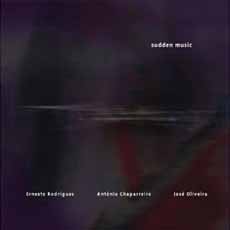
sudden music
Ernesto Rodrigues | António Chaparreiro | José Oliveira | cs002
In «Noise», the essayist Jacques Attali writes that music is no longer a way to mask silence, for the simple fact that, having ceased to incarnate power, it is itself a power. If, along the 20th century, with a particular incidence on the second half, music made everything to surpass in volume and in the quantity of chained auditive events, all other sounds of human production, from the urban to the industrial ones - jazz and rock were nothing (they still are) but examples of this attempt, manifestations of power from specific social groups in relation to what surrounded/surrounds them -, the passage to the new century brought a novelty in the scope of point music: today’s tendency is that music is extracted from silence or that it is “grafted” with silence itself.
The need to “fill” silence, to pretend that it does not exist, is no longer necessary - now, not only it is permitted that silence (apparent absence of sound) is part of the music, but also that… it is music. It is true that this change has been announced for a long time (John Cage), but only now conditions have been achieved (existential, to start with) so that it takes a clear form. If last century was dominated by the aesthetic of noise, announced by the marvelousness of the Futurists in relation to the machine, the new century may as well be marked by the aesthetic of silence, as radical in its reach as the former, judging by the recent routes of Bernhard Günter and Radu Malfatti. It was finally understood that it is not by mimesis that we can give an order, real or imaginary, to the sound chaos of our world. An art music in total refusal is the largest conceivable expression of power.
This process of music “silencing” found in the so called “free improvisation” a specially inviting practice for the new concepts. Nothing more natural: idiomatic (jazz) or not, improvised music always had one of its main characteristcs in the excess of expression. The expressionism is inherent to it, and with more negative to the temptation of the exhibitionist virtuosity. This means that there is a loss in organizative contention, in self-control, in separation as opposed to the created musical product, indispensable factors when it is understood that to improvise is to compose in the immediate.
Now, what the “improvisers of silence” do is just this: they dose an expression, control the compositive drift in real time, give a new importance to each sound withdrawn from nothingness (a sound which, after all, was already there, dissimulated in the immense field of possibilities of Acoustical Physics). This is the approach created by Ernesto Rodrigues and by his companions in «Sudden Music»: the great spaces and intervals they use give the four recorded improvisations a dimension that this type of music usually does not have, and thus they get it down to earth, adjust it to the rhythm of the inner life of all of us, to our biologic rhythm. The power of men is in themselves, not in their factories and offices or in their towns. The music that we listen to here is "sudden" because it emerges as if by miracle from a surface that we thought neutral (silence) to disappear at once, AS IF IT HAD NEVER EXISTED. The sounds that we have perceived are like plants, but if on a given moment they grow with vigour, on the next they withdraw into the subsoil and are never heard again. Everything is sudden, immediate, unexpected, but nothing happens out of its place, nothing is in excess or in need, transmitting to us a curious illusion of PERMANENCE.
Rui Eduardo Paes - (journalist and music writer)